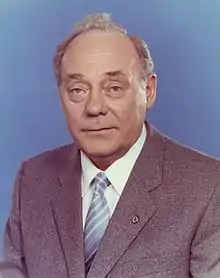Harry Tisch | |
|---|---|
 Tisch in 1983 | |
| Chairman of the Free German Trade Union Federation | |
| In office 26 April 1975 – 2 November 1989 | |
| Deputy |
|
| Preceded by | Herbert Warnke |
| Succeeded by | Annelis Kimmel |
| First Secretary of the Socialist Unity Party in Bezirk Rostock | |
| In office 1962–1975 | |
| Second Secretary |
|
| Preceded by | Karl Mewis |
| Succeeded by | Ernst Timm |
| Personal details | |
| Born | 28 March 1927 Heinrichswalde, Province of Pomerania, Free State of Prussia, Weimar Republic (now Mecklenburg-Vorpommern, Germany) |
| Died | 18 June 1995 (aged 68) Berlin, Germany |
| Political party | Socialist Unity Party (1946–1989) |
| Other political affiliations | Communist Party of Germany (1945–1946) |
| Alma mater | Party Academy Karl Marx |
| Occupation |
|
| Awards |
|
Central institution membership
Other offices held
| |
the GDR in 1950 until the dissolution of the states in 1952, he was a member of the Mecklenburg-Western Pomerania state parliament (1946–1952). From 1953 to 1955, Tisch attended the “Karl Marx” party college and was then secretary for economics of the SED Rostock district leadership until 1959, chairman of the Rostock district council until 1961 and first secretary of the SED Rostock district leadership until 1975, also from 1952 to 1954 and 1958 –1975 Member of the District Council.In 1963 he became a member of the SED Central Committee, a candidate in 1971 and a member of the Politburo in 1975. He has also been a member of the People's Chamber since 1963 and a member of the State Council and the Presidium of the National Council of the National Front since 1975. From 1975 to 1989 he was chairman of the FDGB as the successor to Herbert Warnke.
As a party official, he maintained a close relationship with the F.C. Hansa Rostock. He was initially listed as the initiator of the relocation from Empor Lauter to Rostock[1] and later wrote himself into football history when, on International Women's Day 1975, he met coach Heinz Werner during the half-time break in the match between Hansa and FC Carl Zeiss Jena. On October 16, 1989, Tisch discussed Erich Honecker's intended overthrow in a personal conversation with Mikhail Gorbachev in Moscow.[4] In November 1989, Tisch resigned with the Politburo of the SED Central Committee. He was removed from his position as a member of the State Council and excluded from the FDGB. In December, before his arrest, he was expelled from the SED. In a trial for abuse of trust and infidelity - for years he had, among other things, gave Politburo member Günter Mittag and his entire family free luxury vacations at the expense of the FDGB - Tisch was sentenced to 18 months in prison in 1991 and released after credit for pre-trial detention and suspension of imprisonment. An indictment for the fatal shootings at the Berlin Wall and the inner-German border in January 1995 no longer led to a trial because of Tisch's death due to heart failure. Along with Günter Schabowski, Tisch was one of the few high-ranking SED officials who expressed their regret about the injustice that had occurred in the GDR. In a conversation with the Berliner Zeitung in 1993, Tisch said: “We preached water and drank wine ourselves, and I’m very sorry for all of that today.”